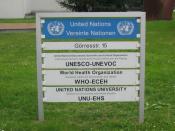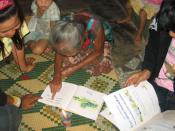Literacy, commonly considered the ability to read and write at a designated level of proficiency. Literacy is more precisely defined as a technical capability to decode or reproduce written or printed signs, symbols, or letters combined into words. Traditionally, literacy has been closely associated with the alphabet and its role in written communication. Literacy has also traditionally been contrasted with oral communication. However, it has become increasingly common to refer to different forms of literacy, such as computer, mathematical, or graphic literacy. Most experts believe that people need a combination of many different forms of literacy to meet the demands of modern life.
Literacy is not an inborn human characteristic, but rather an ability that is learned, most often in schools. No correlation has been found between literacy and intelligence, but literacy and educational level are closely related. Experts have long considered literacy an important contribution to the healthy development of individuals and societies.
However, researchers have found it difficult to confirm widespread expectations that literacy alone will lead to an individual's happiness and well-being, a society's economic growth, or a government's practice of democratic principles. Accordingly, current research focuses on literacy's interactions with culture, economics, and politics, rather than on literacy acting independently of these factors.
BASIC LITERACY AND FUNCTIONAL LITERACY
In most developed nations, nearly all persons beyond age 17 have basic literacy--that is, some skill in reading and writing. In the United States, for example, approximately 98 percent of the adult population can read and write on at least a minimal level. Many developing nations have much lower levels of basic literacy, however. In these countries, the lack of widespread literacy is considered a serious social problem.
Many countries with high levels of basic literacy have much lower levels of functional literacy. Although definitions vary, functional literacy...


